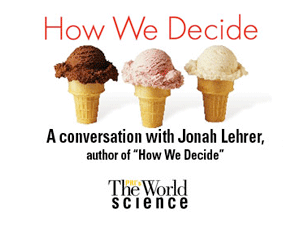The science behind making decisions
The following is not a full transcript; for full story, listen to audio.
Jonah Lehrer is author of “How We Decide,” which examines the latest research on how humans make decisions. Share your thoughts on Jonah’s assertions about decision making with the author and other listeners at “The World” Science Forum.
In this interview on “The World,” Lehrer explains the neuroscience behind decision making, the “sin of certainty” and when we should let our emotional brains take over.
In his book, Jonah explores what scientists refer to as the “certainty track” or the “sin of certainty” where our strong desire to believe we’re right leads us to neglect evidence that we’re not right. He points to the example of the subprime mortgage crisis: “You had all these very, very well trained, well-educated investors working for big fancy hedgefunds, and big fancy investment companies, who had convinced themselves — they had these nifty equations showing these subprime mortgages when they were sliced and diced, weren’t actually risky — they had, you know, this very complicated algorhythm which they used to measure risk … and what they didn’t question was the underlying assumption: Well, what happens if real estate prices go down across the country at the same time. So they locked down on this belief … they were so certain of that these things weren’t risky.”
Jonah also covers how a lot of decisions are best left to the emotional brain, and not the logical: “I think the short way of encapsulating when we should trust our emotional brain — all this kind of unconscious activity — is in situations that involve lots and lots of information, and this gets back to I think, one of the flaws of the rational brain … is that you only take in about seven pieces of information at any given moment, you give it more than that, it starts to short circuit like a computer running Windows Vista.
“You think about when you try to buy a car, how many things there are to think about that if you ask your rational brain to try to assess all that information, it’s not going to be able to do it, and it’s going to start cherry-picking facts. So that’s one situation where you should learn to rely on your emotional brain.”
Share your thoughts on Jonah’s assertions about decision making with the author and other listeners at “The World” Science Forum.
PRI’s “The World” is a one-hour, weekday radio news magazine offering a mix of news, features, interviews, and music from around the globe. “The World” is a co-production of the BBC World Service, PRI and WGBH Boston.
